LOOKING BACK TO LOOK FORWARD
China Daily journalists review the main stories of last year that offered a glimpse of things to come.
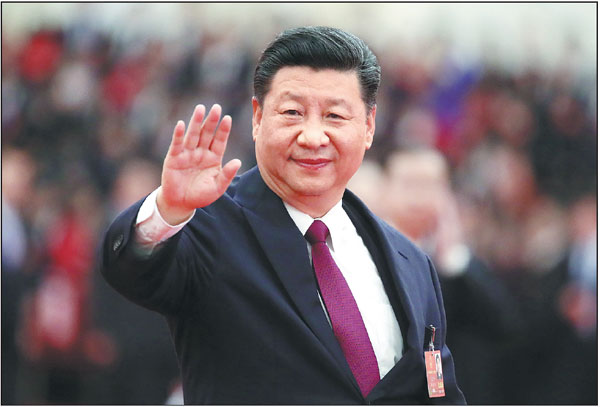
President Xi Jinping waves at the first session of the 13th National People's Congress in Beijing. Lan Hongguang / Xinhua
National People's Congress adopts amendment to the Constitution
On March 11, the National People's Congress, the nation's top legislative body, adopted a landmark amendment to the Constitution, when the third plenary meeting of the first session of the 13th NPC in Beijing enshrined Xi Jinping Thought on Socialism with Chinese Characteristics for a New Era into the fundamental law.
Supervisory commissions were listed as new State organs, while "the leadership of the Communist Party of China is the defining feature of socialism with Chinese characteristics" was highlighted.
Commitment to the path of peace and development, mutual benefits, win-win cooperation, opening up and the building of a community with a shared future for mankind were also written into the Constitution.
On March 17, Xi was re-elected as president and chairman of the Central Military Commission of the People's Republic of China by a unanimous vote at a session of the 13th NPC, thus leading China's drive for modernization, better quality of life, prosperous development and reform in all areas with great political courage.
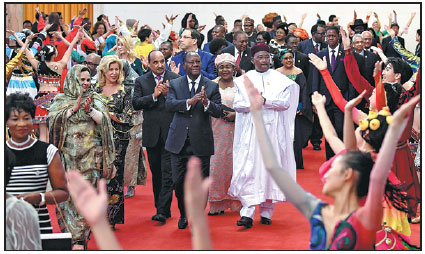
Leaders and their spouses at the 2018 Beijing Summit of the Forum on China-Africa Cooperation on Sept 3. Shen Hong / Xinhua
Nation boosts 'home-field diplomacy'
Last year, China intensified its "home-field diplomacy" by hosting four international conferences.
President Xi Jinping hosted the annual conference of the Boao Forum for Asia, the Shanghai Cooperation Organization Qingdao Summit, the Beijing Summit of the Forum on China-Africa Cooperation, and the first China International Import Expo. When he addressed the events, Xi reaffirmed China's resolve to continue deepening reform and expanding opening up, and to advance the building of a new type of international relations featuring win-win cooperation and the building of a community with a shared future for mankind.
The Forum on China-Africa Cooperation summit in Beijing was the largest and most high-profile diplomatic event ever hosted by China, involving 40 presidents, 10 prime ministers, one vice-president and the chairman of the African Union Commission.
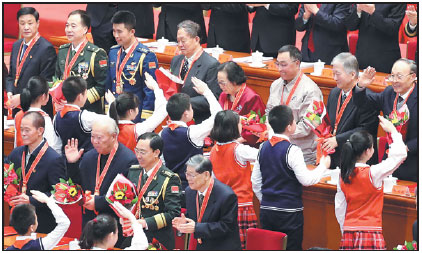
Young Pioneers present flowers to attendees at the gathering at the Great Hall of the People in Beijing. Huang Jingwen / Xinhua
Marking 40 years of reform and opening-up
On Dec 18, a gathering was held in Beijing to celebrate the 40th anniversary of the reform and opening-up policy, which changed China's destiny.
Since the policy was adopted, 740 million people have been lifted out of poverty, and the world's largest social security system has been built, providing basic pensions for more than 900 million seniors and medical insurance for about 1.3 billion people. China's share of global gross domestic product rose from 1.8 percent in 1978 to 15.2 percent last year.
China launched more than 100 major reforms and began construction of a pilot free trade zone in Hainan province. Speaking at the gathering in Beijing, President Xi Jinping said China remains committed to advancing reform and opening-up to realize the aspirations of the Chinese people for a better life and promote joint efforts to build a community with a shared future for mankind.

Workers make national flags at a plant in Fuyang, Anhui province. Jun Ming / For China Daily
Trade dispute puts spotlight on US, China
China and the United States have been in the spotlight as a result of several months of trade tensions. In March, the US ignited a dispute, blaming China for the trade imbalance between the countries and threatening to impose additional tariffs on Chinese imports.
On July 6, the US imposed tariffs of 25 percent on $34 billion of Chinese goods, and China responded in kind. It was the first tangible action China had taken in the escalation of bilateral trade tensions. Following on from that, both sides announced new tariffs on imported goods.
The countries held talks in Washington in August.
On Dec 1, President Xi Jinping and his US counterpart, Donald Trump, met on the sidelines of the G20 summit in Buenos Aires. They agreed to continue negotiations, stop the imposition of new tariffs and exchange visits at appropriate times.
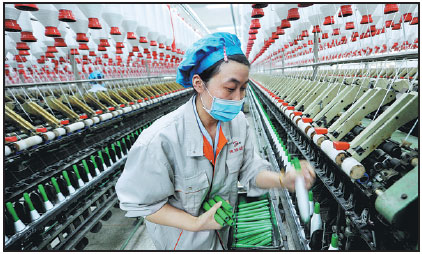
A weaver works at a textile factory in Yushan, Jiangxi province. Zhuo Zhongwei / For China Daily
Private economy drives economic growth
Last year, China reiterated that it respects the role the private economy has played in the country's economic development and its contribution to national prosperity.
At a meeting on Nov 1, Xi Jinping, general secretary of the Central Committee of the Communist Party of China, said it is the Party's consistent policy to support the development of the private economy, and that it will be maintained.
The private economy is acknowledged as an important part of the socialist market economy and is an important basis for the country's economic and social development. By the end of last year, there were more than 27 million private businesses in China.
They accounted for 50 percent of tax revenues, 60 percent of GDP, more than 70 percent of technological innovations and more than 80 percent of urban employment.
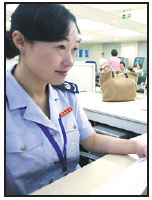
An official at a tax bureau in Zhejiang province helps to implement reforms. Xu Kangping / For China Daily
Tax reforms aim to expand domestic consumption
On Tuesday, additional individual income tax deductions came into force to reduce the burden on Chinese taxpayers.
The deductions cover six categories: children's education; continuing education, healthcare treatment for serious diseases; mortgage interest; rent; and senior care.
The reform will reduce the overall tax burden and optimize the tax structure, especially benefiting people on low and middle incomes.
Before the deductions came into force, new tax brackets were introduced that raised the minimum threshold for personal income tax from 3,500 yuan ($509) per month to 5,000 yuan.
The changes will stimulate consumption and boost domestic demand as a key measure to supplement fiscal policy, according to analysts.
More tax policies will be unveiled this year, Finance Minister Liu Kun said.
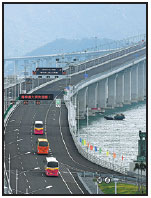
Buses travel along the Hong Kong-Zhuhai-Macao Bridge in October. Liang Xu / Xinhua
Development of Greater Bay Area continues to accelerate
The arrival of key policies and the commissioning of major cross-boundary infrastructure projects saw the acceleration of the development of the Guangdong-Hong Kong-Macao Greater Bay Area last year.
In August, the leading group for the development of the Bay Area held its first meeting, strengthening collaboration in science and technology, and issuing measures to offer easier access to a range of services for people from the Hong Kong and Macao special administrative regions who live on the Chinese mainland.
President Xi Jinping expressed his ambitions for the Bay Area when he met delegations from Hong Kong and Macao in November. He encouraged Guangdong province and the SARs to make institutional reforms under the framework of "one country, two systems" and the Basic Laws, the cities' constitutional documents.
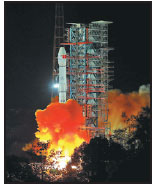
The Chang'e 4 spacecraft is launched at the Xichang Satellite Launch Center in Sichuan province. Jiang Hongjing / Xinhua
National space program becomes a shining star
China made 39 orbital launches, accounting for one-third of space missions across the globe in 2018.
It marked the first time China had surpassed the United States and Russia in terms of space launches in a single year.
China Aerospace Science and Technology Corp completed 37 successful space missions, while China Aerospace Science and Industry Corp conducted one successful launch. A first launch attempt by Land-Space, a private rocket maker, failed.
The most important mission involved the unmanned Chang'e 4 spacecraft on Dec 8. The probe is scheduled to land on the far side of the moon soon and place a robotic rover in the South Pole-Aitken basin.
It will be the first time a space vehicle from any nation has landed on the far side of the moon.

An officer checks rabies vaccine at a center in Liuzhou, Guangxi Zhuang autonomous region. Tan Kaixing / For China Daily
Vaccine scandal results in fines and legislative reforms
In July, the nation's top drug regulator announced that Changchun Changsheng Life Sciences Co had broken the law, including faking production records in the manufacture of a rabies vaccine. A probe uncovered other malpractice by the company, such as using expired materials.
In response, leading officials pledged to impose harsh penalties on violators and reform oversight of the vaccine industry. The company was fined 9 billion yuan ($1.3 billion), the heaviest fine levied on a domestic drug producer in recent years, and senior executives will face criminal charges. The incident led to changes in legislation, with the Drug Management Law being revised. A new law, the Vaccine Management Law, was drafted and submitted to the top legislature for a first review at the end of last year.

Fan Bingbing. China Daily
Movie star scandal prompts changes in payment of taxes
In one of last year's biggest celebrity scandals, A-list actress Fan Bingbing was fined 883 million yuan ($128 million) for tax evasion, highlighting a nationwide crackdown on the practice to regulate tax payments in the film and television sector.
On Oct 3, Fan - China's highest-earning entertainer according to Forbes magazine in 2017 - posted an apology on her Weibo account two hours after Xinhua News Agency reported the fine, the largest of its kind in recent years.
On Oct 10, the State Administration of Taxation started a campaign to regulate tax payments, and ordered all companies in the sectors of film and television to audit all tax payments made since 2016.
Those who made remedial payments before Dec 31 will be exempt from administrative punishments, while those who refused to take action will be punished, according to the administration.
(China Daily 01/03/2019 page5)


















